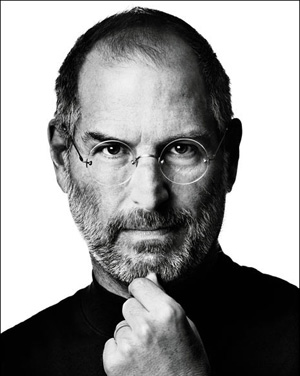Not only did Steve Jobs create an iconic company that will be remembered forever, he is an icon whose legacy will be profound for years to come. Steve Jobs, the creator of Apple whose products many Staples students use daily, passed away onOct. 5, 2011.
David Pogue, a Westport resident, is a technology columnist and commentator who has shared his views in various media including newspapers, blogs, television, podcasts, and online videos. He is best known for his technology columns for the New York Times and monthly articles in Scientific American. He appears on CNBC and CBS weekly and hosted a miniseries on PBS. He has co-written seven books in the “For Dummies” series and has his own series of how-to books called Missing Manual. Pogue has spoke to Jobs a few times every year to discuss each others work and converse about technology.
Q: In your article the New York Times about the death of Steve Jobs it says that you knew him to some degree? Could you briefly describe your relationship with Jobs?
A: As a Times writer, I got to meet him once or twice a year, almost always after some product introduction. I’d get about 15 minutes to ask him questions and chat. So it was a professional relationship–but a very unusual one for a CEO. That is, he was always well-informed about stuff I’d written, and just as quick to praise as he was to criticize.
He was not what you’d call a warm person; he was reputed to have a particular distaste for the media, in fact. But I also ran into him at a couple of Apple Store openings, where he was in a good mood, and there, he was always friendly.
Q: How did Jobs affect your work in regard to the articles you wrote and your view on technology?
A: Over the years, he’d call me to tell me what he thought of something I wrote. It made for fun next-day conversation, but I can’t say he ever really affected my writing or my judgments.
Q: What do you think Steve Jobs will be best remembered by?
A: I’m sure he’ll be remembered primarily for changing the technology landscape. The way he fundamentally changed how people buy music and TV shows, for example, or turned the cellphone into a pocket computer that runs software of our choice.
He was also determined and focused, yes, but so are lots of people. I think it’s his vision that was most remarkable.
Q: As a technology columnist, what recent technology innovator had the most influence on you?
A: As the biggest technology company with the most frequent innovative product introductions, Apple certainly got the most press – not just from me. Google and Microsoft are probably close.
Q: What do you see for Apple’s future without Jobs?
A: They have several years’ worth of upcoming products already in the pipeline. So for the next few years, at least, Apple will still be Apple without Mr. Jobs.
But Jobs had an uncanny ability to know what the public wanted even before we did. He just had a natural sense of what the next great thing would be, years before the rest of the industry. I doubt there’s anybody quite like that at Apple – or anywhere else.
Apple will always produce beautiful, satisfying products. But after the current pipeline is empty, I doubt it will be able to keep up the same pace of invention without Steve Jobs.
Q: What was your reaction when you heard the news that Steve Jobs had died?
A: We all knew that he was very sick. At the end of August, he resigned as CEO. For him, that seemed like a huge step.
Even so, I was stunned to read the headline. There’s a difference between knowing something’s going to happen –and actually experiencing it. I think it’s a huge loss – this one guy basically steered the entire electronics industry, and there’s nobody ready to take his place in that role.
Q: In your article for the New York Times about the death of Steve Jobs, you stated that you believe that the “odds are zero” for another person to be like Jobs with the same visionary skills and unconventional paths. Why do you believe this?
A: Well, because if there were any other people like Jobs, we would know about them! Can you name anyone else with anywhere near the same vision or success?
You might be able to name a CEO who’s had one great invention (the Google guys). But who has had five or ten or 15 over 15 years the way Jobs had?
It’s because he had some skills that other people can replicate–as a designer, a businessman, a marketer–and one that nobody else could: that thing about seeing the future of consumer taste. All of that in one person–it seems very unlikely that we’ll ever see that again.
Q: In your article the New York Times about the death of Steve Jobs it says that you knew him to some degree? Could you briefly describe your relationship with Jobs?
A: As a Times writer, I got to meet him once or twice a year, almost always after some product introduction. I’d get about 15 minutes to ask him questions and chat. So it was a professional relationship–but a very unusual one for a CEO. That is, he was always well-informed about stuff I’d written, and just as quick to praise as he was to criticize.
He was not what you’d call a warm person; he was reputed to have a particular distaste for the media, in fact. But I also ran into him at a couple of Apple Store openings, where he was in a good mood, and there, he was always friendly.
To view the article that Pogue wrote about the death of Steve Jobs for the New York Times, click here















































Kylia • Nov 13, 2011 at 4:36 am
Free info like this is an apple from the tree of kownledge. Sinful?